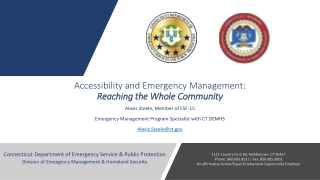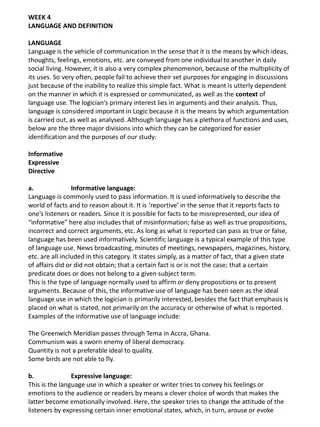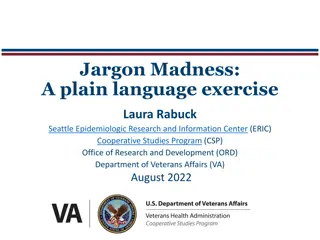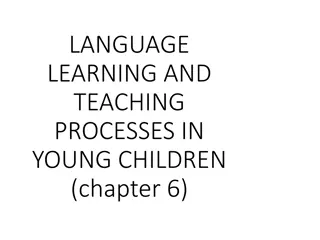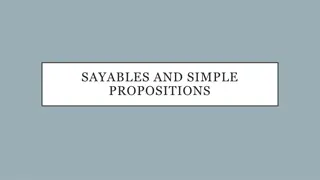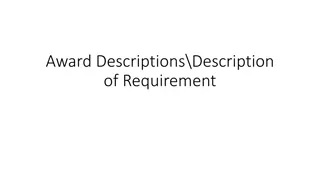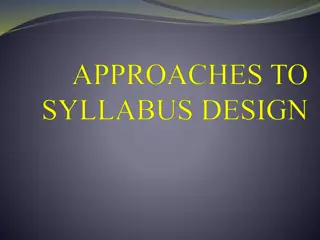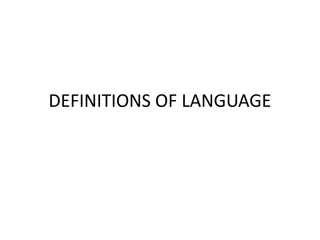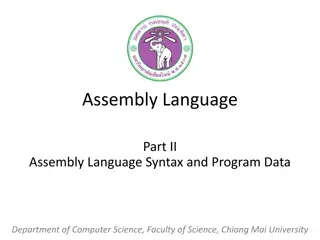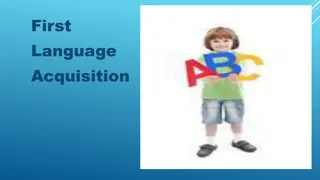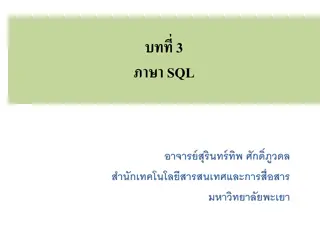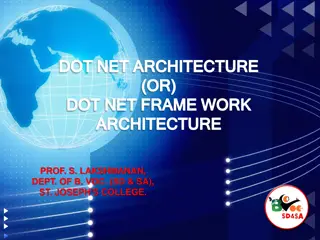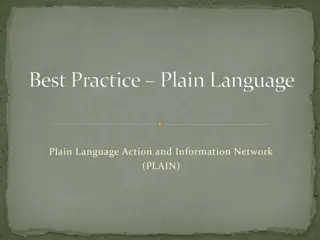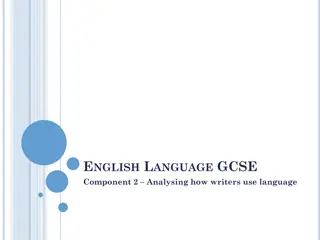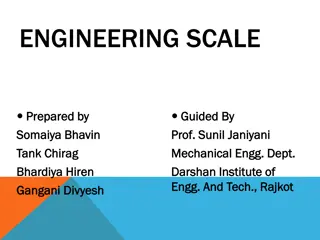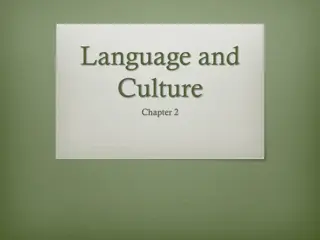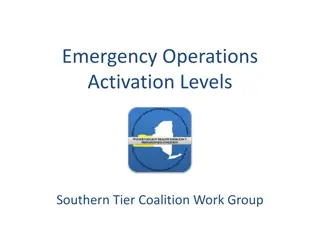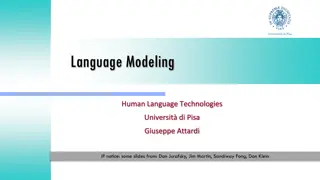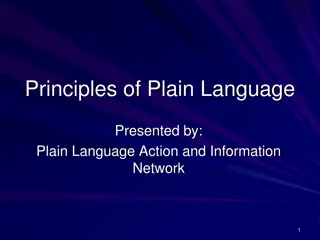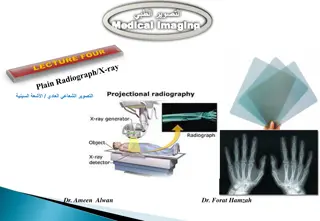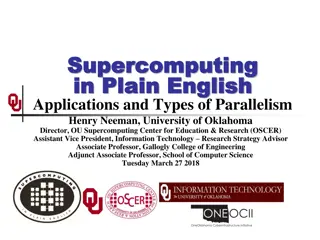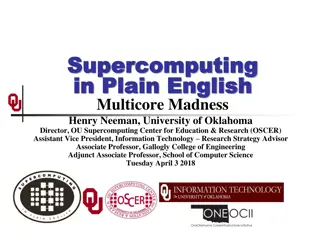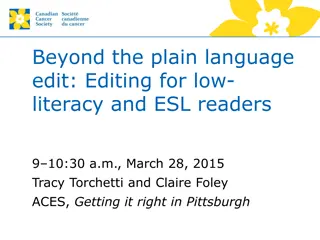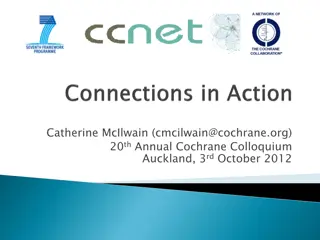Accessibility and Emergency Management:
Engage the whole community in emergency management by employing accessible communication strategies. Consider language diversity, plain language materials, and partnerships with ethnic media and faith-based groups to ensure crucial information reaches everyone effectively.
0 views • 15 slides
Career Opportunities and Challenges in Translation & Interpreting Pedagogy Post-Pandemic
The APTIS 2022 conference explores new avenues in Translation and Interpreting (T&I) pedagogy amidst a changing landscape. Dr. Bego A. Rodriguez highlights emerging roles for T&I graduates. The context reveals a decline in language learning in the UK, impacting the Language Service Industry. The UK'
0 views • 13 slides
Language Study Community – Enhance Your Language Skills
Joining a Language Study Group is a fantastic way to take your language learning to the next level. By leveraging the power of Group Study, you can immerse yourself in the language, enhance your understanding, and build confidence in your speaking abilities. Read full article \/\/explainlearning.com
1 views • 3 slides
Academic Language Demands and Supports in Instructional Planning
Academic Language Demands and Supports are crucial in educational settings to ensure comprehension and usage of language by students. This content discusses embedding language demands in lesson plans, providing language supports, and peer review activities to enhance academic language skills. The fo
6 views • 10 slides
The Significance of Media in Language Learning
Media plays a crucial role in language learning by raising awareness of the ideology behind linguistic structures and providing valuable information on society and culture. Linguists are drawn to media language for research purposes and to understand its impact on language use and attitudes. Media s
12 views • 5 slides
Understanding Translation: Key Concepts and Definitions
Translation involves transferring written text from one language to another, while interpreting deals with oral communication. Etymologically, the term "translation" comes from Latin meaning "to carry over." It is a process of replacing an original text with another in a different language. Translat
11 views • 76 slides
Language and Communication in Society: Understanding Interactions
Explore the intricate relationship between language and society through lectures focusing on language in interaction, power dynamics, language contact and change, public space discourse, linguistic landscaping, and more. Delve into the shift from structural linguistics to societal communication, red
6 views • 28 slides
Understanding Language: Informative, Expressive, and Directive Uses
Language serves as a vital medium for communication, allowing the conveyance of ideas, thoughts, and emotions. It is a complex phenomenon with diverse uses. This text delves into the three major divisions of language use - informative, expressive, and directive. Informative language conveys facts, w
4 views • 6 slides
Enhancing Oral Health Awareness: Effective Communication Strategies
Explore communication strategies to engage your community and promote oral health awareness, focusing on using plain language, presenting data effectively, engaging the public proactively, and leveraging social media. Understand the importance of clear communication in promoting oral health, and lea
0 views • 57 slides
Decoding Jargon Madness: A Plain Language Exercise
Explore the concept of Jargon Madness, a plain language exercise to tackle complex jargon in professional settings. Discover why addressing jargon is crucial, what jargon entails, and how to host your Jargon Madness event. This engaging approach encourages clear communication, teamwork, and fosters
0 views • 34 slides
Language Learning and Teaching Processes in Young Children
Development of language in young children is influenced by various factors such as their cultural and linguistic environment, unique characteristics, and interactions with adults. Optimal language development requires language stimulation from the environment. Varied cultural practices impact langua
1 views • 51 slides
Understanding Language in Stoicism: Significance and Corporeality
Language in Stoicism plays a crucial role in the process of assenting to impressions by focusing on corporeality, reason, and truth. It distinguishes between the mundane vocal sounds, articulated speech, and significant language to convey meanings effectively. The significance of language lies not i
2 views • 13 slides
Guidelines for Writing Clear Award Descriptions in Federal Procurement Data System (FPDS)
Ensure all descriptions of requirements in FPDS are clear, concise, and in plain English. Avoid using acronyms, abbreviations, or jargon. Describe accurately what is being purchased or modified. Be cautious of auto-populated information and ensure consistency with corresponding FPDS fields. Include
0 views • 7 slides
Understanding Language Teaching Syllabus: Integration, Theory, and Approaches
Language Teaching Syllabus involves the integration of subject matter and linguistic elements, guided by theories of language and learning. Various approaches like Grammatical, Situational, Communicative, and Analytic are used to structure syllabi. Breaking language into parts aids in sequential lea
1 views • 28 slides
Exploring Language and Communication Through a Short Film
In this lesson, students will watch a 10-minute short film titled "The Most Beautiful Thing" by Cameron Covell. They will reflect on the value of learning another language, analyze how facial expressions and body language convey emotions, and develop empathy towards those facing language barriers or
0 views • 29 slides
Various Definitions of Language Throughout Linguistic History
Different linguists and scholars have offered various definitions of language over time. Sapir (1921) emphasized language as a method of communicating ideas, emotions, and desires through voluntary symbols. Bloch and Trager (1942) focused on the social aspect of language as a system of vocal symbols
1 views • 12 slides
Introduction to Assembly Language Syntax and Program Data
Learn about the syntax of assembly language and how data, variables, and constants are used in programming. Explore the basic instructions and the translation of high-level language into assembly language. Discover the role of an assembler in translating assembly language programs into machine langu
4 views • 36 slides
Enhancing Language Learning Across the Curriculum in B.Ed. 1st Year Course
Language Across the Curriculum (LAC) emphasizes that language learning should occur across all subjects, not just in language classrooms. It highlights the importance of incorporating language development into every learning activity, fostering multilingualism in schools. Language plays a crucial ro
2 views • 34 slides
Understanding First Language Acquisition Process
First language acquisition is the process through which humans develop the capacity to perceive, comprehend, and effectively use language to communicate. It primarily focuses on infants acquiring their native language. Basic requirements, caregiver speech features, and the acquisition schedule play
0 views • 19 slides
Comprehensive Overview of SQL Commands and Language Categories
In this detailed guide, you will learn about Structured Query Language (SQL) including its various commands such as Data Definition Language (DDL), Data Manipulation Language (DML), Data Control Language (DCL), and Transaction Control Language (TCL). Explore how SQL is used in Database Management Sy
0 views • 15 slides
Speech and Language Developmental Milestones: A Bilingual/Multilingual Perspective
Speech and language developmental milestones are crucial for children, regardless of their home language. These milestones encompass receptive language, expressive language, pragmatics, and articulation and phonology. Understanding how a child hears and talks from birth to one year is essential, as
1 views • 23 slides
Understanding .NET Framework Architecture and Common Language Runtime
This content delves into the intricacies of .NET architecture, highlighting its structure, common language runtime, and key components such as Common Type System (CTS) and Common Language System (CLS). It explains how .NET supports multiple languages, facilitates cross-language interoperability, and
0 views • 13 slides
Plain Language in Federal Agencies: Compliance and Implementation
The Plain Writing Act of 2010 mandates federal agencies to communicate clearly with the public in documents related to benefits, services, and compliance. This act sets deadlines for agencies to designate officials, train staff, use plain language, and report compliance. The Act does not cover regul
0 views • 20 slides
Analyzing Writer's Language Use in English Language GCSE Component 2
In English Language GCSE Component 2, students learn to analyze how writers use language. The learning objective focuses on commenting, explaining, and analyzing language use with relevant subject terminology. The exam assesses students on their ability to interpret and explain a writer's thoughts,
0 views • 12 slides
Engineering Scale and Different Types of Scales
Engineering scale plays a crucial role in reducing or enlarging dimensions of large or tiny objects to fit standard size drawing sheets. This article covers the concept of reducing scale, representative factor, types of scales like plain, diagonal, vernier, and more, along with detailed construction
0 views • 11 slides
Language and Culture Reflections: Diversity in Linguistic Emphasis
Exploring the correlation between language and culture, this content delves into how various languages reflect cultural values and priorities. Through examples like the Inuit language with rich vocabulary for snow and seals, the Shinzwani culture's unique word for mother and aunt, and the evolving l
0 views • 50 slides
Emergency Operations Activation Levels in Healthcare
Develop a plain language Emergency Operations Plan activation level matrix to enhance the common operating picture among healthcare and emergency management agencies. Hospitals use varying means to describe activation levels, and implementing plain language descriptors will facilitate mutual aid and
1 views • 13 slides
Understanding Language Modeling in Human Language Technologies
Exploring the concepts of language modeling in human language technologies, this presentation delves into N-grams, the chain rule of probability, evaluation metrics like perplexity, smoothing techniques such as Laplace, and the goal of assigning probabilities to sentences. It covers applications lik
1 views • 81 slides
Introduction to Language Technologies at Jožef Stefan International Postgraduate School
This module on Knowledge Technologies at Jožef Stefan International Postgraduate School explores various aspects of Language Technologies, including Computational Linguistics, Natural Language Processing, and Human Language Technologies. The course covers computer processing of natural language, ap
0 views • 27 slides
Understanding Plain Language: Techniques, Examples, and Mandates
Plain language is about clear communication that your audience can easily understand. This article covers the definition, techniques, main elements, myths, mandates, and reasons for using plain language. Learn how to create user-friendly content that is accessible to all. Explore the impact of the P
0 views • 70 slides
Exploring Sociolinguistics: Language Variation and Social Factors
Sociolinguistics delves into the study of language variation influenced by social factors, examining the relationship between language and its social context. It explores various aspects like standard pronunciation, language choice, speech acts, language components, language variety, and factors suc
0 views • 73 slides
Understanding Assembly Language Programming for Computing Layers
Assembly language is a low-level programming language that enables direct interaction with a computer's hardware components. This content explores the fundamentals of assembly language, the relationship between human-readable machine language and binary code, an assembly language program for multipl
0 views • 31 slides
Understanding Plain Radiograph/X-ray in Medical Imaging
Plain radiograph/X-ray is a fundamental tool in medical imaging that utilizes X-rays to create images of the human body. It provides fast, high-resolution, low-cost images without requiring special patient preparation. Components include the X-ray tube, detector, anti-scatter grid, couch, Bucky tabl
0 views • 10 slides
Understanding Language Anxiety in Foreign Language Learning and Teaching
Explore the impact of language anxiety on students and teachers in foreign language learning and teaching contexts through insights from Dr. Christina Gkonou's research. Delve into the theoretical background, implications for language education, and real-life experiences shared at the Essex Language
0 views • 25 slides
Understanding Plain & Reinforced Concrete Structures
Concrete is a vital construction material, with Plain Cement Concrete (PCC) and Reinforced Cement Concrete (RCC) being common types. PCC lacks reinforcement and is strong in compression but weak in tension. On the other hand, RCC combines concrete with steel reinforcement for improved tensile streng
0 views • 10 slides
Understanding Plain & Reinforced Concrete Structures in Design Engineering
In the design of Plain & Reinforced Concrete structures, various strength design methods such as Ultimate Strength Design (USD) and Allowable Strength Design (ASD) are utilized. These methods involve factors of safety, material strength, load factors, and analysis in the elastic range. Additionally,
0 views • 11 slides
Supercomputing in Plain English: Applications and Types of Parallelism
Explore the world of supercomputing with Henry Neeman from the University of Oklahoma. Join this informative session to learn about applications and types of parallelism in plain English. Remember to download the slides beforehand and mute yourself during the session for an optimal experience. Find
0 views • 107 slides
Supercomputing in Plain English: Multicore Madness Workshop Details
Prepare for the "Supercomputing in Plain English: Multicore Madness" workshop with important instructions such as muting yourself, downloading slides in advance, and accessing the session via Zoom or YouTube. The session, led by Henry Neeman from the University of Oklahoma, covers supercomputing top
0 views • 97 slides
Enhancing Literacy: Strategies for Effective Communication
Explore strategies for improving communication with low-literacy and ESL readers, delving into plain language editing, Canadian literacy statistics, factors influencing literacy, writing techniques, and readability best practices. Learn about the importance of plain language, effective writing techn
0 views • 38 slides
Enhancing Plain Language Summaries for Consumer Involvement
Improving plain language summaries is crucial for supporting consumer involvement in healthcare decision-making. This presentation highlights the importance of clear communication, showcasing the impact of enhanced summaries and addressing challenges in achieving consistency and quality. Key areas o
0 views • 22 slides
